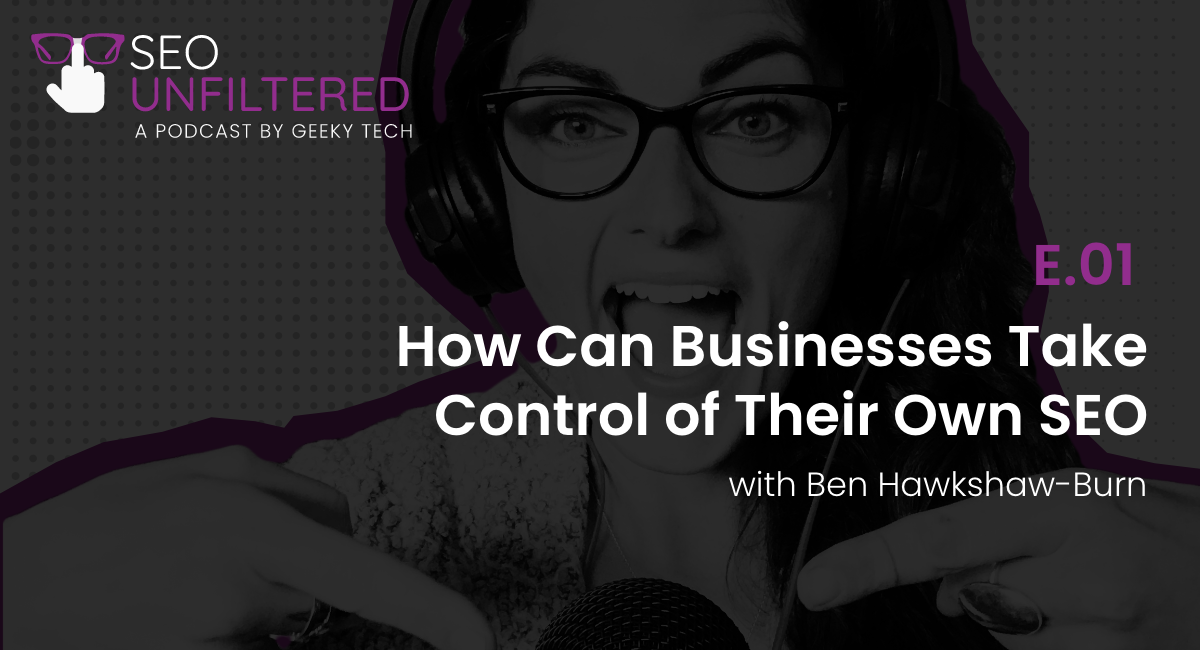There’s a lot of information on the internet about SEO—too much, in fact. So much so that marketing managers or business owners, like yourself, may be bogged down by the sheer amount of information (a lot of it BS) about search engine optimisation.
That’s why we’re here to wipe the slate clean. We want to make SEO easy and accessible for everyone.

To simplify things, we’re going to break down SEO into its three main foundations: keywords, on-page SEO, and off-page SEO. To start this three-part series, which we’re calling ‘SEO Fundamentals’, let’s dive into what many people call ‘step one’ of search engine optimisation: keyword foundations, research, and strategy.
Quick Facts About Keyword Research & Strategy
Its purpose: to make your site searchable on Google; to drive more relevant traffic to your site
Examples of keyword strategy: keyword themes, keyword silos, latent semantic indexing (LSI), competitor keyword analysis, ‘quick wins’, content optimisation
Keyword research tools: Moz, Google Search Console, SE Rankings, LSI Graph, SEMRush, WordStream
What Are Keywords and What Do They Do?
We assume you know what this basic SEO term means, but we did call this series ‘SEO Fundamentals’, so we’re going to err on the side of caution in case you managed to avoid those digital marketing meetings you were supposed to attend.
Many marketers think of keywords like top-secret codes that are added to content in order for Google to rank their pages. It’s probably not that helpful to think about keywords as completely separate from the other words on your page.
It’s actually much easier than that.
Let’s say I want to know more about blockchain technology. I type ‘what is blockchain technology?’ in Google, and in less than a second, our trusty search engine has sorted through the most relevant web pages and ranked them according to which ones most accurately answer my question. How does Google know which web pages answer my question? By finding content that features that exact same search term.
Sounds kinda straightforward, right?
Finding the Right Search Terms
The strategy bit in keyword strategy is understanding who your customers are, what they’re searching for, and then developing a list of various keywords that serve their search queries (but we’ll get to that later).
Because keywords help you get ranked, they also help you outrank your competitors. Lest we forget, you aren’t the only game in town, and your customers can have their pick of thousands, if not millions, of websites that answer my question ‘what is blockchain technology?’. There are a lot of sites similar to yours that are in the race to reach a higher position on Google who are also using that exact same search term. Depending on your strategy, keywords can be focused on local or international. The better your keyword strategy, the more likely you are to outrank the competition.
To reiterate, keywords do three things:
Where Your Keywords Need to Go
There’s an art, or more accurately, a science to keyword implementation. Keywords not only need to be relevant and on your page, they also need strategic placement and a certain amount of density in your page’s word count…don’t ask us why—we don’t make the rules.
Keywords should be included in the body of your content and other on-page elements (such as your title tags and headers). The more relevant your keywords, the more likely Google will understand how to rank you and the more relevant your traffic will be.

Now, it’s time to add another keyword principle into the mix:
Ranking for More than One Keyword
You’re vying for the top position in the most competitive digital real estate market in the world. Using only one keyword term throughout your entire site with the hopes of ranking is like painting your house the same colour as every other house on the street and hoping it’ll stand out.
Search engine optimisation is the reason behind all this keyword talk. You don’t just want you to show up on Google. You want to be the best on Google.
Let’s sum up what we know so far about keywords:
- A keyword is a bit of text included within your site to help you drive relevant traffic, rank in Google, and compete with similar sites
- Keywords should be varied and strategically placed within the body of the copy and in other on-page elements.
Your Site Is Already Using Keywords
Getting your keywords on the page comes naturally. I mean, if you sell men’s shoes, your web content probably already has rankable search terms containing something similar to ‘men’s shoes’ (unless you’re doing something really, really wrong).
Many web pages already are optimised for certain keywords, which is great! That means you’re in the race. But in a world where 75% of users never bother checking out page two of SERP (that stands for search engine result pages, by the way), you could be getting way more traffic than you are now by diversifying your keyword terms.
Understanding User Intent and Search Behaviour
We just mentioned that using various keywords in your copy is more likely to boost your rankings and drive relevant traffic to your site. What we didn’t mention is why.
Let’s talk about your target audience. In a perfect world, all the customers you reach are already looking to hit the ‘buy’ button. Of course, this isn’t the case. Some are still researching competitors for the best products or services. Some don’t even know what solutions are out there.
Knowing how your audience searches the internet at various stages of their buying journey (also known as user intent) is going to help you come up with a variety of key phrases that match their search queries.
User intent can be broken down into four categories that reflect how your target audience searches the internet:
1. Informational: The user wants to know something. These searches are often question based and include what, where, why, when, or how.
2. Navigation: The user wants to find a specific website or a certain page on a website.
3. Commercial: The user is in the decision stage of buying a product and needs additional information to get to the next step.
4. Transactional: The user has an intent to buy a product; search queries are specific to reaching a page in order to make a transaction.
So, part of the keyword strategy phase is incorporating key phrases that match queries. Not every page has to match every stage of the user intent. For example, if you’re building an e-comm site, your product pages likely won’t include keywords that speak to buyers at the informational stage.
Why?
Because if your customer has reached that page, their search queries are going to be transactional. Conversely, you don’t want to hit your target audience with a ton of salesly language if they’re looking for information that can be found on your landing page.
Not All Keywords Are Created Equal
If the point of implementing keywords into your web pages is to get more traffic, you’ll need to come up with the most kick-ass keywords that will give you the best possible chance of outranking your competitors.
For example, let’s say you represent a tech company that sells word processing software to professional freelance content writers. You already know you’re up against giants like Microsoft Word, Apache OpenOffice, Pages, and Google Docs—popular companies with trusted websites whose SERP rankings probably aren’t going anywhere.
You don’t need fancy tools to know what you’re up against. Typing “word processor” into Google Search doesn’t show you start-up SaaS companies. Page one is reserved for the heavy hitters.
We’re not saying that your word-processing software shouldn’t use the term “word processor” in your copy, but we are saying that if you want to rank, you need to be a little more creative when it comes to choosing the keywords you want to rank for.
Keep in mind that your competitors are already using the same kind of terms you are to beat out sites like yours, so part of your strategy is figuring out which keywords are most likely to get you ranked.
Use Long-Tail Keywords
Users know that if they want to find what they’re looking for, they have to be specific. If someone who wants to go apple-picking types “apple” in Google, they’re far more likely to find search results for Apple products than they are for local farms.
Not only are single keywords vague and ambiguous, they’re also difficult to rank for. A single word can produce billions of search results, and even if that single word is relevant to your site, it’s not likely you’ll be able to build content that will outrank a high-authority site.
A good strategy is to develop long-tail keywords, which is a keyphrase with words a user will naturally type in their search query. So, instead of typing ‘apple’, your long-tail keyword becomes ‘apple-picking near me’ or ‘best places to go apple-picking in my area’.
Using long-tail keywords helps Google match you to relevant searches.
Using Your Competitors’ Keyword Rankings for Better Insights
All this keyword research doesn’t exist inside a vacuum. Digital marketers spend a lot of time meticulously researching your competitors’s keywords to help you beat them. How well your site ranks is relative to the keyword rankings of other sites.
Using various keyword tools (which we’ll go into later) here’s what an SEO team does to find out how your site compares to others:
Compare your and your competitors’ websites to find out what keywords are ranking in certain countries.
Review your competitors for their ranking content to find the high-value keywords your domain isn’t ranking for in the top 100 positions.
Find out which keywords you’re already ranking for at the bottom of page one to page two of Google. Making small page optimisations to these sites can unblock traffic and boost your rankings. Your site might not necessarily have any ‘quick wins’.
Understanding Keyword Themes & Relevance
Keyword themes simply cover each topic on your website. For example, if you run inventory management software for various industries, then you’ll have a list of keyword themes that might look like this:
- ‘Inventory management software for food services’
- ‘Medical inventory management software’
- ‘Inventory management software retail’
- ‘Warehouse inventory management software’
As you can see from the above list, the themes are food services, medical, retail, and warehouse. From this list of themes, you can pull keyword clusters, which are keywords and key phrases that match a certain theme.
Building keyword themes gives you a broader list of more relevant keywords your site will rank for. Now, anyone from those industries looking for IMS for that particular business will be able to find you.
Understanding Relevancy
You may have heard of the term keyword relevancy. This is yet another easy concept that quickly gets complicated.
In essence, keyword relevancy is the notion that certain keywords or phrases are more important to your site than others.
If your company makes fitness trackers, your site is naturally going to be about fitness. But if you look at all the subtopics that fall under fitness, you might think it’s a smart SEO tactic to try and rank for protein powders and supplements. While you can easily make the mental leap from fitness tracker to protein powders, at the end of the day, you don’t want Google thinking you sell protein powder.
That’s not to say that you can’t talk about various subjects pertaining to fitness. But, we don’t necessarily recommend developing a keyword strategy based on not-quite-relevant keywords. Trying to rank for irrelevant keywords will lead to a decrease in your current rankings because Google will struggle to understand your site.
It’s better for your search engine optimisation to rank for a narrow set of the most relevant keywords than for a big handful of irrelevant ones.
Page Cannibalisation
While the term makes it sound like your website is going to start eating itself, what page cannibalisation (or keyword cannibalisation) really means is that you have two or more pages trying to rank for the same keyword, which leads to both of them getting ranked lower. This also happens when two of your pages have similar (but not exact) keywords you’re trying to rank for.
Basically, your pages end up competing with each other. When that happens, Google doesn’t know which page deserves the higher rank, and the result is that neither page ends up winning.
This is a common mistake that many companies make when they know about the importance of keywords, but may not necessarily understand Google’s many ranking factors.
How to Fix Cannibalised Pages
Not sure how to do this? We can help. Get in touch with one of our Geeks to receive a FREE site-wide audit.
What Tools You’ll Need to Find the Best Keywords for Your Site
We’re not expecting someone new to keyword strategy to walk away with enough knowledge to tackle keywords like a pro. It takes practice and the kind of common sense that comes with experience. But, if you’re interested, we recommend learning how to use various keyword tools that are user-friendly and inexpensive (sometimes free).
Here are some keyword tools we recommend:
What Have We Learned About Keywords?
We hope this has given you a better understanding of what keywords are and how they are fundamental to search engine optimisation. Here’s a breakdown of what we learned today:
- Keywords and keyphrases are bits of text written in your copy and on various page elements to help you rank in Google, get more relevant traffic, and outrank your competitors.
- Keywords should reflect user intent and take natural speech into consideration. Knowing how your customers search the internet will give you a better idea of what your keywords should be.
- Keywords should be varied, specific, and relevant. You shouldn’t be trying to rank for the same keyword on multiple pages. Keywords should naturally be themed to cover all topics on your website.
- Not all keywords are worth trying to rank for, and so, it’s important to research your competitors to see how your site compares, so you can:
- Find out what essential keywords are missing from your site.
- What keywords are easy to rank for.
- What quick improvements you can make to strengthen your existing pages.
Why You Can Trust Us to Know About SEO Keyword Research
Geeky Tech is a digital marketing company based out of Guildford, UK. We offer in-house SEO, web design, and paid advertising services to world-changing technology companies. We’re kind of obsessed with SEO, and a lot of the information we shared with you today is based on our own techniques.
Join us in our three-part series we’re calling ‘SEO Fundamentals’ to give you a solid understanding of the three main areas of SEO and why they’re so gosh-darn important for your digital marketing efforts.
- What keywords are and why they’re important
- Why you need a keyword strategy
- Where your keywords need to go
- The relationship between user intent and keywords
- Keyword quality
- Why knowing how your competitors rank will help you develop a keyword strategy
- Keyword themes and relevance
- What page cannibalisation means
- Starter keyword tools
- Why you can trust us













